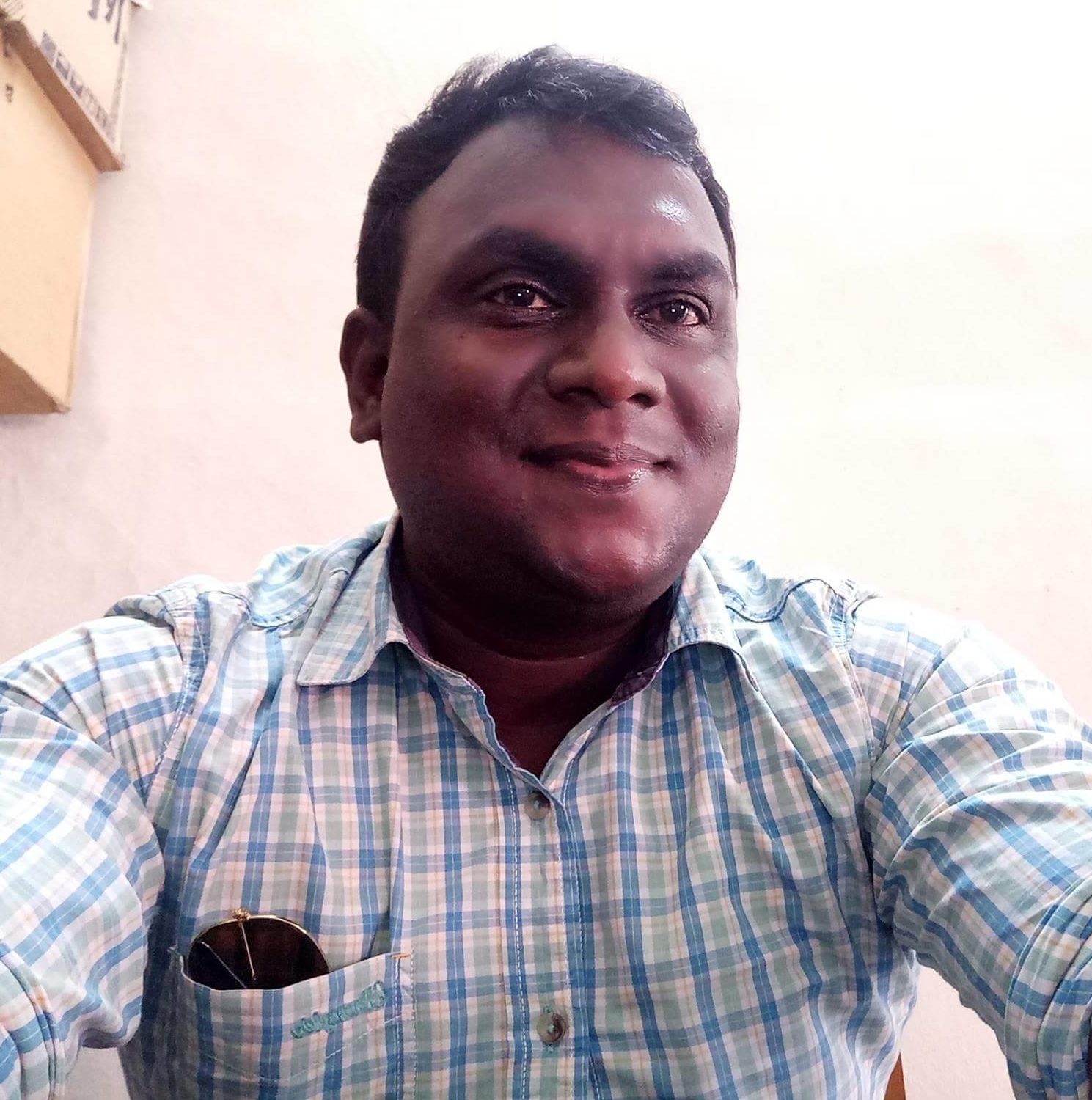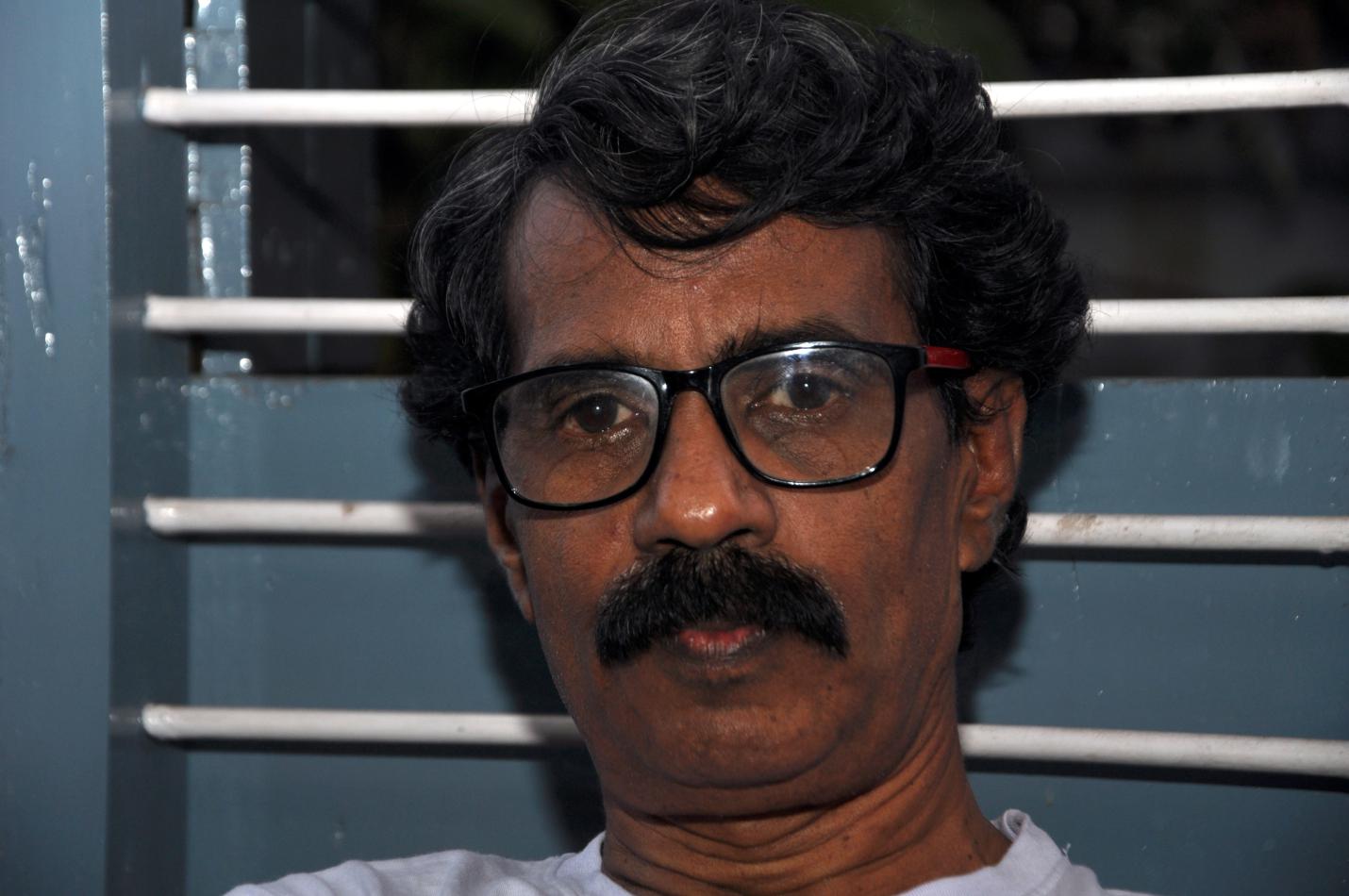BIO
Born in Alappuzha, encircled by the backwaters of Kerala, Sudheer Raj’s parents were teachers. He joined the Indian Air Force at a tender age of 17 without completing his studies. He had started writing at the age of 10, but stopped it completely during his twenty years of military service. He took retirement at the age of 37 and completed his college education with a BA degree in political science. He has been writing poems from then that have become recordings of dalit life in Kerala. All his poems relate to social issues. He possesses a language that is free flowing like a song and he is a great performer of his poems.
.
BIO
Ra Sh (Ravi Shanker N) has published English-language poems in many national and international online and print magazines, such as Kindle magazine, the German online journal STRASSENSTIMMEN, Indian Literature published by Kendriya Sahithya Academy and Countercurrents among others. His poems have been translated into German and French. Fifteen of his poems appear in an anthology, A Strange Place Other Than Earlobes, published by Sampark, Kolkata that featured five Malayali poets writing in English. His sole collection of poems, Architecture of Flesh, was published by Poetrywala, Mumbai, in December 2015.
His translations into English include Mother Forest (the biography of C. K. Janu) and Harum-Scarum Saar and Other Stories(stories by Tamil writer Bama), both published by Women Unlimited, Delhi; and Waking is Another Dream (Sri Lankan Tamil poems translated along with Meena Kandaswamy), published by Navayana, Delhi. Again, Navayana, Delhi, published translations of Malayalam stories by Dalit writers done by Rash and Abhirami Sriram, under the title Don’t want Caste recently. Ra Sh translated and edited translations of thirty-seven young Malayali poets for RædLeafPoetry-India in 2015. He has also translated for Dalit Anthologies published by OUP and Penguin-India.
(Translated from the original Malayalam into English)
.
When a dalit writes a poem
when a dalit writes a poem, an appoppan
with matted hair is seized by frenzy
drumming his udukku.
the blind karinkaaliyammoomma howls out
a song that splinters the heart of the earth.
the words sowed like the seeds of pox fester
like boils on bodies.
the lines crawling on the ground roar like ottamulachi
with spikes on her back.
noon-time lunacies broil like a severe sun’s glare and cry out – take us away take us away.
curses upon curses rattle in the mud pots of relentless pain till they are thrown at poetry
and shattered.
when a dalit is seized by poetry
and dances in throes,
god is stunned.
digging a hole in the ground
it lies in wait for the
head pulayan’s palm, like a seed.
it germinates in the hands
that never stopped feeding
till they went to waste.
when a dalit writes a poem,
time stands still.
it pleads
please, please give me also a word!
the word, the earth, the sky, the netherworld,
antiquity, grandeur, the world and the life
stand as one stalk of bamboo,
a bamboo born to a single mother.
Dalit – ` broken men’ or the downtrodden ones, outcastes, whose status is the lowest in the hindu religion.
Appooppan – granddad/ancestor
Udukku – a small drum
Karimkaaliyammoomma – grandma, as dark as Kali.
Ottamulachi – a one-breasted demi goddess.
Head pulayan – the head of the pulaya community who used to work like serfs on the fields.
ദളിതന് കവിതയെഴുതുമ്പോള്
ദളിതന് കവിതയെഴുതുമ്പോള്
ജടപിടിച്ചൊരപ്പൂപ്പന് ഉടുക്കുകൊട്ടിയുറയും
കണ്ണുപൊട്ടിയ കരിങ്കാളിയമ്മൂമ്മ
മണ്ണിന്റെ ചങ്കു പൊട്ടിയ്ക്കുമൊരു പാട്ട് പാടും .
വസൂരി വിത്ത് പോലെ വാക്കെല്ലാം വന്നു
കൂരാപ്പു പോലെ കുരിപ്പ് കുത്തും .
മുതുകത്തു മുള്ളുള്ള ഒറ്റമുലച്ചി പോലെ
വരിയെല്ലാം കിടന്നലറും
നട്ടുച്ചയ്ക്കിറങ്ങും നട്ടപ്രാന്തെല്ലാം
പൊരിവെയിലു പോലെ തിളയ്ക്കും
ഞങ്ങളെയങ്ങോട്ടെടുക്കോ
എടുക്കോയെന്നു കരയും
പ്രാക്കായ പ്രാക്കെല്ലാം
നോവിന്റെ കുടുക്കേലിട്ടു കുലുക്കി
കവിതേലെറിഞ്ഞുടയ്ക്കും
ദളിതൻ കവിതയായുറയുമ്പോൾ
ദൈവം പകയ്ക്കും
മണ്ണിലൊരു കുഴികുത്തി വിത്തായി
തലപ്പുലയന്റെ കൈ കാത്തു കിടക്കും
വാരിവാരിക്കൊടുത്തു മുടിഞ്ഞ
കയ്യിലേക്കൊരു കുഞ്ഞായ് കിളിർക്കും.
ദളിതൻ കവിതയെഴുതുമ്പോൾ
കാലമവിടെ നില്ക്കും
ഏനും കൂടൊരു വാക്ക് തായോന്ന് കെഞ്ചും
വാക്കും മണ്ണും വിണ്ണും പാതാളവും
പഴമയും പെരുമയും ഉലകുമുയിരും
കാറ്റത്തൊറ്റ മുളപോലെ നിൽക്കും
ഒരമ്മ പെറ്റ മുളപോലെ നിൽക്കും .
*****
.



